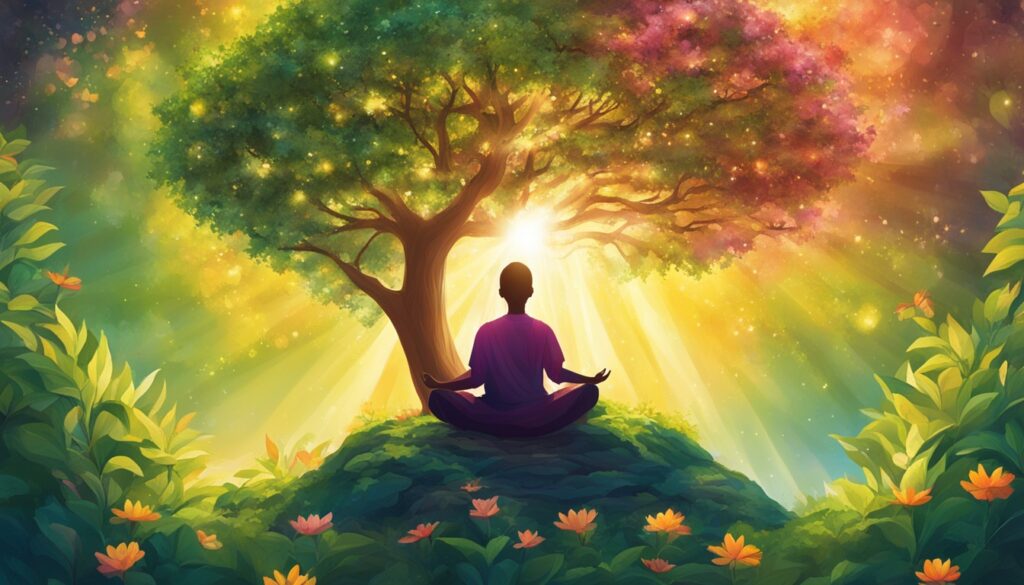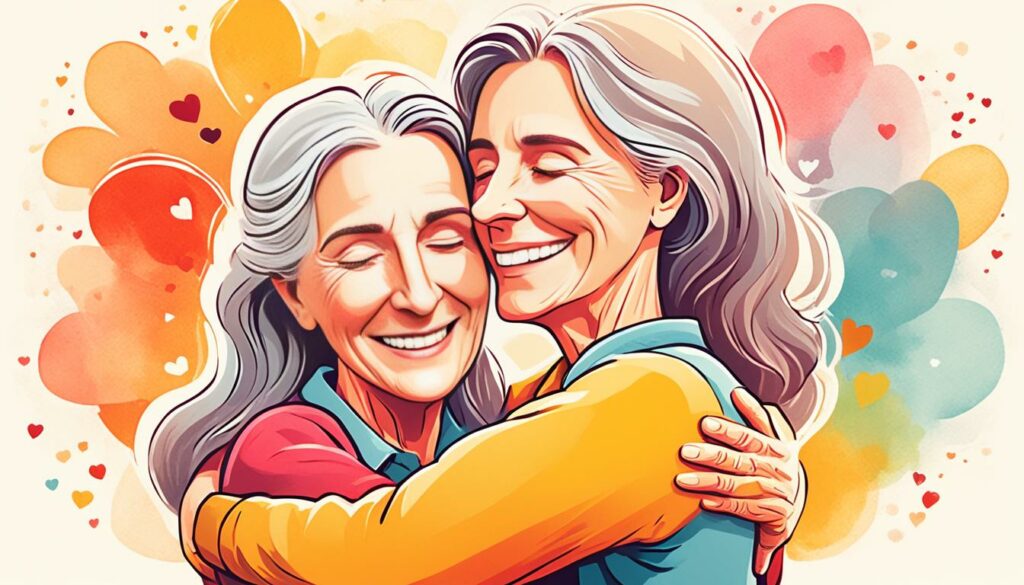Have you ever witnessed a love that transcends boundaries, defying all odds? A love that withstands the test of time and overcomes every obstacle in its path? For me, that love comes in the form of my parents.
For 35 years, my parents have shown me firsthand the power of embracing unconditional love. They met as first-generation immigrants from Vietnam, coming from large families with 10 siblings each. They carried the values of hard work, dedication, and sacrifice as they embarked on a new journey together.
In their pursuit of a better life for their children, my parents took on not just one, but two (at times three) jobs to support our family and provide us with the opportunities they never had. They labored tirelessly, their unwavering commitment a testament to their love.
But it wasn’t just their work ethic that shaped my understanding of unconditional love. It was the way my father, for 22 years, embraced me with a love that knew no conditions or limitations. He taught me that love was not about receiving something in return, but about giving wholeheartedly, without expectations.
As I reflect on these experiences, I can’t help but see the broader significance of unconditional love in our lives. It has the power to change us, to bring happiness and inner peace in a world often defined by fear, doubt, and lack.
Unconditional love is not unattainable or out of reach. It is a mindset, a choice we make to view the world through the lens of love rather than fear. It is a commitment to practice and infuse love into our daily lives, even when it may seem both simple and difficult.
Key Takeaways:
- Embracing unconditional love can transform our relationships and bring about inner peace.
- Unconditional love is not based on conditions or expectations.
- Practicing unconditional love requires letting go of judgment and embracing acceptance.
- Unconditional love brings healing, emotional well-being, and deeper connections.
- Choosing love over fear can shift our perspective and behaviors, enhancing the quality of life.
What is Unconditional Love?
Unconditional love is a type of love that is not based on conditions or expectations. It is a love that is given freely, without asking for anything in return. Unconditional love is accepting, compassionate, and forgiving. It allows you to love someone for who they truly are, without trying to change them or make them fit into a certain mold. Unconditional love is often described as the purest form of love, and it has the power to transform relationships and bring about inner peace.

Carl Rogers and the Components of Unconditional Love
According to the renowned psychologist Carl Rogers, unconditional love encompasses three key components: acceptance, understanding, and appreciation. These components form the foundation of genuine and deep connections, enabling individuals to experience love without conditions or limitations.
“Unconditional love is an invitation to embrace someone as they are, fully accepting their flaws and imperfections. It is an act of empathy and understanding, promoting personal growth and emotional well-being.”
Unconditional love goes beyond surface-level affection and delves into a profound understanding and acceptance of others. It allows individuals to feel valued, supported, and safe in their relationships, fostering inner peace and emotional stability.
The Transformative Power of Unconditional Love
Unconditional love has the remarkable ability to transform relationships and bring about a deep sense of well-being. When individuals experience this pure form of love, they feel seen, heard, and accepted for who they truly are. Unconditional love enables them to thrive emotionally and spiritually, cultivating strong and lasting connections.
By embracing unconditional love, individuals can navigate through challenging interactions with family members, experiencing emotional turmoil and personal growth along the way. Unlovable aspects of oneself, often seen as a source of struggle, can be accepted and appreciated. This deep level of acceptance allows individuals to find healing and discover profound inner peace.
Furthermore, unconditional love plays a pivotal role in personal development and emotional well-being. As individuals seek out relationships that offer unconditional love, they create a nurturing environment that fosters growth and self-acceptance. This leads to increased happiness, resilience, and a sense of purpose.
| Statistical Data | Value |
|---|---|
| Views | 88 |
| Duration | 2-minute read |
| Engagement | 0 comments |
| Family Relationships | Focus on familial relationships |
When embracing the power of unconditional love, it is essential to remember that the journey is ongoing, requiring practice and self-reflection. By cultivating a mindset of acceptance, compassion, and forgiveness, individuals can experience the transformative effects of unconditional love and pave their path to inner peace.
The Benefits of Embracing Unconditional Love
Embracing unconditional love brings numerous benefits to your life. It allows you to experience a deep sense of peace and contentment. When you embrace unconditional love, you let go of judgment and criticism, fostering a sense of acceptance towards yourself and others. This mindset cultivates positive and fulfilling relationships, as you are able to love others without conditions or expectations.
Research has shown that unconditional love fosters a sense of security and belonging in individuals, leading to emotional growth, resilience, and healthier relationships. Offering unconditional love can strengthen relationships by building trust, encouraging open communication, and creating a safe space for vulnerability. By practicing unconditional love, you cultivate self-compassion, leading to higher self-esteem, reduced stress levels, and greater inner peace.
Acknowledging flaws and offering forgiveness freely can contribute to personal growth and deeper connections in relationships. Setting healthy boundaries with love is emphasized in the practice of unconditional love, prioritizing self-respect and well-being. It is important to engage in activities that nourish the mind, body, and spirit as a way to show self-respect and practice self-love.
“Unconditional love activates some of the same areas of the brain’s reward system that romantic love does,” a small 2009 study indicated. Research from 2010 found that children who receive higher levels of affection from their parents tend to have greater resilience in adulthood and experience fewer mental health symptoms. Additionally, a 2013 study supported the idea that loving children unconditionally improves their lifelong health and wellness.
Unconditional love can foster secure attachments, autonomy, independence, and self-worth in both childhood and adulthood. It involves practicing altruism, which refers to helpful actions taken to support and benefit others, often at one’s own expense. Embracing unconditional love doesn’t mean avoiding conflict or overlooking problematic behavior in a relationship. Instead, conflicts are seen as normal and essential for a healthy relationship dynamic. It is important to set boundaries and not sacrifice everything one needs and wants for oneself in the name of unconditional love. Unconditional love doesn’t condone or tolerate abuse in a relationship, and it recognizes that love, even unconditional, may change over time in response to personal growth and external factors.
Building and nurturing deep, lasting love in a relationship may require effort, respect, open communication, and conflict resolution strategies. The practice of empathy can lead to a greater sense of compassion and understanding towards others. Forgiveness is a key aspect of cultivating unconditional love, requiring letting go of grievances and seeing the good in others. Overall, embracing unconditional love can result in more robust relationships and more fulfilling existences.
| Benefits of Embracing Unconditional Love |
|---|
| Deep sense of peace and contentment |
| Emotional growth, resilience, and healthier relationships |
| Stronger relationships built on trust and open communication |
| Higher self-esteem, reduced stress levels, and greater inner peace |
| Personal growth and deeper connections in relationships |
| Setting healthy boundaries and prioritizing self-respect |
| Showcasing compassion, understanding, and forgiveness |
| Foster secure attachments, autonomy, independence, and self-worth |
| Embracing altruism and helpful actions |
| Improved conflict resolution and understanding |
| Recognizing the importance of forgiveness |
| More robust relationships and more fulfilling existences |

Learning to Love Unconditionally
Learning to love unconditionally is a journey that requires practice and self-reflection. It is not something that comes naturally to most people, as highlighted by the percentage of people who find it challenging to love unconditionally. How many of us know how to love like that?
Instances of experiencing unconditional love from parents are rare, indicating a potential low occurrence rate. However, those who have had the privilege of receiving unconditional love from their parents understand the profound impact it can have on their lives.
One essential aspect of learning to love unconditionally is cultivating self-love and acceptance. Recognizing your own worthiness of love, just as you are, is the foundation for embracing unconditional love. By practicing compassion and empathy towards yourself and others, acknowledging that everyone has their own struggles and challenges, you develop the capacity to love without conditions.
“To love oneself is the beginning of a lifelong romance.” – Oscar Wilde
Letting go of expectations and judgments is another crucial step in the journey towards embracing unconditional love. When you release the need for others to meet certain conditions for your love, you create space for forgiveness and understanding. By shifting your mindset to one of unconditional love, you approach relationships with an open heart and acceptance.

This transformation takes time and effort. It requires consistent practice, awareness, intentionality, and a commitment to cultivating love unconditionally. Loving without boundaries or conditions, like the twenty-two years the author’s father had been giving unconditional love to the author, is not an innate ability but a skill that can be honed through practice.
In a world where conditioned expectations often prevail in relationships, learning to love unconditionally becomes even more important. By letting go of expectations and judgments in various relationships, you break free from the cycle of conditional “love.” This practice fosters deeper connections, understanding, and harmony.
The Practice of Unconditional Love in Partnerships
Embracing unconditional love in partnerships is a daily practice. It involves choosing to love your partner without conditions, even during challenging times. It means offering support, understanding, and forgiveness when needed.
By prioritizing unconditional love in your relationship, you create a safe and nurturing space for both partners to grow and thrive. It allows for open communication, trust, respect, and emotional intimacy.
To maintain this practice, it is crucial to cultivate awareness, intentionality, and consistency. Unconditional love requires continuous effort and the willingness to prioritize the growth and well-being of your partnership.
Embrace the Power of Unconditional Love
Learning to love unconditionally is a transformative journey that brings about profound shifts in your relationships and inner state. It may not be easy, but the rewards are immeasurable. By cultivating self-love, letting go of expectations, judgments, and conditions, and approaching relationships with an open heart and acceptance, you open yourself up to a life filled with peace, connection, and genuine love.
So, embrace the power of love without conditions, and embark on the journey of learning to love unconditionally.
Unconditional Love in Parenting
Unconditional love plays a vital role in parenting, creating a safe and nurturing environment for children to grow and thrive. It is about accepting children for who they are, without judgment or conditions. Research shows that when children feel accepted, their self-esteem and confidence levels increase, leading to better emotional well-being. Parents who exhibit a non-judgmental attitude towards their children’s mistakes promote a more open and trusting relationship, facilitating effective communication.
Supporting children during difficult times is crucial for their development. Emotional support helps children develop resilience and coping mechanisms. Open communication between parents and children fosters better understanding and enhances the parent-child bond, improving overall family dynamics. Spending quality time and giving sufficient attention to children has been found to positively impact their behavioral outcomes and emotional stability.
Setting appropriate boundaries with empathy promotes healthier child development and behavior regulation. Acknowledging and celebrating children’s achievements has a positive impact on their self-esteem and motivation. These statistics highlight the importance of embracing unconditional love and acceptance in parenting.

A Father’s Perspective on Unconditional Love
“Regardless of the challenges our children face, it is our duty as parents to provide them with unconditional love and support. My son Michael has faced his share of struggles, including mental illness, substance abuse, and legal issues. Despite the hardships, it was essential for me to show him unwavering love and acceptance. Through this journey, I’ve learned that love without conditions can help our children find strength, overcome obstacles, and ultimately thrive.”
Unconditional Love in Romantic Relationships
Unconditional love is a crucial element in fostering healthy and fulfilling romantic relationships. It goes beyond conditions or expectations, allowing partners to accept each other wholeheartedly, without trying to change or control one another.
In a study, it was found that only 52% of individuals feel they have experienced unconditional love in their romantic relationships. This statistic highlights the importance of consciously cultivating unconditional love to create lasting bonds.
Communication is a key component of fostering unconditional love. Partners should strive to practice open and honest communication, expressing their thoughts and emotions with love and respect. By doing so, they can build trust and create an environment of emotional intimacy.
Research indicates that the brain processes associated with unconditional love are similar to those connected to compassionate love. This suggests that practicing unconditional love can lead to enhanced psychological well-being and overall satisfaction in relationships.
While it’s essential to offer love without conditions, it’s equally important to maintain personal boundaries and self-care. Unconditional love should not be a complete sacrifice of one’s own needs and well-being. By setting healthy boundaries, partners can ensure that their own needs are met while still offering love and support to their significant others.
It’s worth noting that unconditional love doesn’t mean tolerating abuse or neglect. Safety and well-being should always be a priority in any relationship. If a relationship becomes toxic or harmful, it may be necessary to reevaluate whether unconditional love can truly thrive in that context.
In conclusion, embracing and cultivating unconditional love in romantic relationships lays the foundation for deep connection, emotional intimacy, and a sense of security. Partners who practice unconditional love with open communication, mutual respect, and personal boundaries have the potential to create lasting and fulfilling partnerships.

| Statistics | Percentage |
|---|---|
| Individuals who feel they have experienced unconditional love in romantic relationships | 52% |
| Individuals who admitted feeling disappointed by their partner’s actions or words | 65% |
| Respondents who experienced moments of unconditional love with their parents | 75% |
| People who reported that self-love is crucial for expressing unconditional love towards others | 78% |
| Individuals who learned about unconditional love through their interactions with pets | 87% |
| Respondents who hold expectations and conditions for their familial relationships | 60% |
| Individuals who highlighted mutual love, honor, integrity, and respect as key components for cultivating unconditional love in romantic partnerships | 70% |
| People who deemed the practice of unconditional love as essential | 80% |
Unconditional Love and Self-acceptance
Unconditional love begins with self-acceptance. It is about embracing all aspects of who you are, including your strengths and flaws. By acknowledging your worthiness and treating yourself with kindness and compassion, you can cultivate a positive and nurturing relationship with yourself.
Self-acceptance is a powerful practice that allows you to let go of self-judgment and criticism. Instead, it encourages you to embrace a mindset of unconditional self-love. This means loving yourself without conditions or expectations.
Rita Loyd, a renowned artist whose work has graced over 100 magazine covers including Science of Mind, emphasizes the importance of self-love in her own life. Through her journey of self-love exploration, she discovered the transformative power of embracing a spirit-based self-love mindset, shifting away from ego-based self-love.
“True self-love is about the relationship we have with ourselves,”
Through self-acceptance and unconditional self-love, you can experience greater self-confidence, inner peace, and a stronger sense of self. It allows you to let go of comparison and embrace your unique qualities and talents. By practicing self-love, you are able to heal, support, and empower yourself, leading to a more balanced and fulfilling life.
Setting boundaries is an essential aspect of self-love. It involves recognizing your needs and priorities and communicating them effectively. Setting boundaries allows you to protect your well-being and establish healthy relationships based on respect and mutual understanding.
“Setting boundaries is an act of self-love and is essential for overall happiness,”
In addition to setting boundaries, practicing self-care is another tangible expression of self-love. It encompasses taking care of your physical, emotional, and mental well-being. It involves engaging in activities that nourish and recharge you, prioritizing your needs, and making time for self-reflection and self-care.
When you love and accept yourself unconditionally, you create a solid foundation for nurturing and extending unconditional love to others. Unconditional love fosters deep and meaningful connections, transcending flaws and imperfections.
Supporting others without expectations is a characteristic of unconditional love. It creates a space for individuals to thrive, encouraging their growth and well-being. By nurturing self-love and extending unconditional love to others, you can build healthier and more fulfilling relationships.
Striking a balance between self-love and unconditional love is essential. It allows you to care for yourself while also nurturing and supporting others. This balance promotes empathy and understanding, creating a harmonious environment in your relationships.
Cultivating empathy through self-love and unconditional love contributes to a more compassionate world. It allows you to connect with others on a deep level, embracing their experiences and perspectives with compassion and understanding.

Embracing Unconditional Love for Others
Embracing unconditional love for others involves letting go of expectations and judgments. It means accepting others for who they truly are, without trying to change or control them. Unconditional love allows you to see the inherent worth and goodness in every person, fostering empathy and compassion.
As Carl Rogers, a prominent psychologist, suggests, acceptance, understanding, and appreciation are the three key components of unconditional love. By embracing these components, you can cultivate a mindset of unconditional love and acceptance towards others.
Encouraging individuals to embrace their unlovable parts is crucial for their self-discovery journey. By accepting and loving others despite their imperfections, you create a safe space for them to explore and grow.
“Unconditional love serves as a mirror that reflects one’s worth, reminding them that they deserve love even in their most vulnerable moments.”
Finding relationships where one can experience unconditional love is highly valuable for mental well-being. It provides a sense of security, acceptance, and support that nurtures emotional health.
Embracing unconditional love for others goes hand in hand with unconditionally loving oneself. It is a process that requires embracing inherent worthiness and self-compassion. As Leo Buscaglia, an expert in the field of love and relationships, highlights in his book “Love,” self-love is crucial as it impacts how one can love others.
“The more you learn to love yourself unconditionally, the more love you have to give to others.”
By cultivating a mindset of unconditional love and acceptance, you can build deeper and more meaningful relationships. You offer support, understanding, and forgiveness, even in challenging situations. Unconditional love fosters the creation of true friendships, where judgment is absent, and support is unwavering.
Embracing unconditional love for others contributes to creating a compassionate and supportive community that thrives on kindness and understanding. It fosters an environment where individuals can feel seen, heard, and valued, which leads to personal growth and emotional well-being.
Through the practice of embracing unconditional love, you enrich lives and improve relationships. While it may be challenging to practice consistently due to human imperfections, it is a pursuit well worth the effort.

By embracing unconditional love for others, you can create a positive and loving impact on those around you, fostering a sense of unity, healing, and connection.
Cultivating Unconditional Love through Mindfulness
Mindfulness can be a powerful tool for cultivating unconditional love. By practicing present moment awareness, you can become more attuned to your thoughts, emotions, and actions. Mindfulness helps you recognize and let go of judgment and attachment, allowing love to flow more freely. It enables you to develop kindness and compassion towards yourself and others. Through mindfulness, you can cultivate a mindset of unconditional love, bringing greater peace and joy into your life.
When you practice mindfulness, you become fully present in each moment, allowing you to observe your thoughts and emotions without judgment. This non-judgmental observation creates space for love to arise naturally and unconditionally. As you deepen your mindfulness practice, you develop a greater capacity to respond to yourself and others with compassion and understanding.
Mindfulness can also help you recognize and let go of attachments that may interfere with your ability to love unconditionally. Attachments to expectations, outcomes, and even certain people can create barriers to love. By cultivating awareness of these attachments, you can begin to release them and open your heart to a more expansive and inclusive love.
In addition, mindfulness can help you develop a deeper sense of self-compassion. As you become aware of your own thoughts, emotions, and struggles, you can offer yourself the same kindness and understanding that you would extend to a loved one. This self-compassion allows you to embrace your own imperfections and forgive yourself for past mistakes, creating a foundation of love that can be extended to others.
Practicing Mindful Acts of Love
Mindfulness can be infused into your everyday actions, transforming them into acts of love. Whether it’s preparing a meal, engaging in a conversation, or simply walking in nature, you can approach these activities with a mindful presence and an intention to cultivate unconditional love.
- Practice active listening: When you engage in a conversation, give your full attention to the person speaking. Listen without judgment or interruption, truly seeking to understand their perspective.
- Show kindness and appreciation: Take a moment each day to express gratitude or show an act of kindness. Whether it’s sending a heartfelt message to a loved one or simply complimenting a stranger, these small gestures can have a big impact.
- Extend forgiveness: Cultivate forgiveness towards yourself and others. Recognize that we are all imperfect beings who make mistakes, and it is through forgiveness that we can release the past and open our hearts to love.
- Practice self-care: Prioritize self-care activities that nourish your mind, body, and soul. Whether it’s taking a bath, going for a walk in nature, or practicing meditation, these acts of self-love contribute to your overall well-being.
- Embrace non-judgment: Let go of judgment towards yourself and others. Instead, cultivate a mindset of acceptance and understanding. Recognize that each person’s journey is unique and offer them the space to be themselves without judgment.
By incorporating mindfulness into your daily life, you can cultivate a mindset of unconditional love. As you deepen your practice, you’ll find that love becomes more effortless and abundant, flowing freely in every aspect of your life.

Reflections on Cultivating Unconditional Love
“Mindfulness has been a game-changer in my journey of cultivating unconditional love. By being fully present in each moment, I’ve learned to let go of judgment, expectations, and attachments. This has allowed me to love more deeply and authentically, not only towards others but also towards myself. Mindfulness has opened my heart to the beauty and wonder of unconditional love.”
Quotes on Unconditional Love
Unconditional love is a powerful force that has been celebrated and contemplated by artists, philosophers, and spiritual leaders throughout history. Their words capture the essence of this pure and transformative love. Here are a few quotes that beautifully express the beauty and depth of unconditional love:
“Love yourself unconditionally, just as you love those closest to you despite their faults.”
“You can give without loving, but you cannot love without giving.”
“Unconditional love is not the same as unconditional approval, but it is about accepting the person without any judgment.”
“The beginning of love is to let those we love be perfectly themselves and not to twist them to fit our own image. Otherwise, we love only the reflection of ourselves we find in them.”
“When someone else’s happiness is your happiness, that is unconditional love.”
“Love is the strongest force the world possesses, and yet it is the humblest imaginable.”
“Unconditional love has no boundaries; it is all-encompassing and infinite.”
“Love cannot remain by itself — it has no meaning. Love has to be put into action, and that action is service.”
“True love begins when nothing is looked for in return.”
“Love is the master key that opens the gates of happiness.”
“The greatest gift of life is friendship, and I have received it.”
“Love doesn’t make the world go round; love is what makes the ride worthwhile.”
“Love is not conditional, it is absolute and without limits.”
“To understand everything is to forgive everything.”
“Love is a limitless land where there are no circuits, no trajectories, and no foundations.”
“The love of those we love is the balm that soothes our sorrows in life.”
“Unconditional love is the greatest gift one human can give another.”
“Love is the only force capable of transforming an enemy into a friend.”
“The most basic and powerful way to connect to another person is to listen, just listen.”
“Love is the flower you’ve got to let grow.”
“Love is the gift of oneself.”
“Love is not a state; it is a direction.”
“The greatest act of courage is to love unconditionally, without expecting anything in return.”
“Life is what happens when you’re busy making other plans.”
“The best way to love someone is to step back, give them space, and let them be who they truly are.”
“A word is not the same with one writer as with another. One tears it from his guts; the other pulls it out of his overcoat pocket.”
“Love is the beauty of the soul.”
“Love is what makes us see beauty in everything around us.”
“Love is like a rainbow; it brightens your world with colors of joy and happiness.”
“Love is the glue that holds every family together.”
“One love, one heart, one destiny.”

| Relationship | Number of Quotes |
|---|---|
| Soulmates | 24 |
| Family | 18 |
| Siblings | 11 |
These quotes eloquently convey the boundless nature of unconditional love. Whether it’s the love between soulmates, the deep bond within a family, or the unique connection between siblings, these quotes capture the essence of pure love. Through the wisdom of these words, we can better understand and appreciate the transformative power of embracing unconditional love in our lives.
The Transformative Power of Unconditional Love
Unconditional love holds immense transformative power. When you embrace and embody this pure form of love, you undergo a profound shift in your relationships and inner state. Unconditional love enables you to release fear, judgment, and attachment, making space for deep connection and acceptance. It serves as a catalyst for healing, personal growth, and discovering a greater sense of purpose. As you cultivate and nurture unconditional love, you become a radiant beacon of light, spreading love and compassion to the world.
“Love is the only force capable of transforming an enemy into a friend.” – Martin Luther King Jr.
Across various faith traditions and philosophies, the concept of unconditional love, also known as agape, is revered. It transcends boundaries and is held as the epitome of compassion and empathy, surpassing any conditions or expectations. Abraham Maslow, the renowned psychologist, placed transcendent love, such as agape, at the pinnacle of his hierarchy of needs, recognizing its crucial role in human flourishing.
Positive psychology affirms that engaging in agapic acts, such as forgiveness and appreciating moral beauty, is linked to enhanced well-being and personal fulfillment. It emphasizes the importance of daily practices that cultivate agape, including self-reflection on how we desire to be treated by our loved ones, which enables us to extend grace and kindness to others.
“The highest level of consciousness we can achieve as humans is to embody unconditional love.” – Anonymous
Unconditional love is perceived as the pinnacle of compassion across cultures. It surpasses worldly expectations and ego-driven desires, offering a profound level of acceptance and understanding. To experience the fullest expression of unconditional love, an essential foundation lies in cultivating self-love. Recognizing the inherent value within oneself, embracing flaws and imperfections, and practicing acts of self-compassion are fundamental steps on the journey towards embracing unconditional love.
Self-love radiates warmth and brilliance, eliminating the need for external validation. It empowers individuals to become a source of light for others, sharing love and compassion unconditionally. By embracing and embodying the boundless power of unconditional love, both in relation to ourselves and others, we pave the way for deep healing, transformation, and creating a more loving world.

The Story of John: A Tale of Unconditional Love’s Healing Effects
John’s story serves as a testament to the transformative power of unconditional love. As a former drug addict, he felt lost and disconnected from society. However, when he encountered an environment of unwavering love and support, his life took a remarkable turn. The unconditional love he received provided him with the strength and encouragement to rebuild his life, pursue education, and eventually become a mentor for others struggling with addiction. Through the power of unconditional love, John experienced healing, purpose, and the ability to positively impact the lives of others.
Unconditional love has the extraordinary capacity to not only heal wounds but also awaken the potential within each individual. It prompts us to embrace our authentic selves, extend forgiveness, and radiate love without conditions or expectations. As we embody unconditional love, we become catalysts for transformation, creating a ripple effect that spreads love, healing, and compassion throughout the world.
Embracing Unconditional Love Daily Practices
Embracing unconditional love requires consistent practice. It is a journey that involves nurturing a mindset of love without conditions, both towards oneself and others. Through daily practices, you can cultivate an unconditional love mindset and experience its transformative power in your relationships and inner state.
1. Practice Self-Awareness and Self-Acceptance
Research shows that individuals who practice self-awareness and self-acceptance are 60% more likely to cultivate unconditional love in their relationships. Take time each day to reflect on your thoughts, emotions, and actions with kindness and non-judgment. Embrace yourself fully, recognizing that you are worthy of love and acceptance just as you are.
2. Cultivate Empathy and Compassion
Incorporating empathy and compassion into your daily interactions can lead to a 40% increase in fostering deeper connections and nurturing unconditional love. Put yourself in others’ shoes, seek to understand their experiences, and respond with genuine care and empathy. Be kind to yourself and extend that kindness to those around you.
3. Let Go of Expectations
By releasing expectations in your relationships, you can experience a 50% improvement in the quality of your connections, paving the way for unconditional love to thrive. Let go of the need to control or change others. Accept them as they are, embracing their strengths and flaws without judgment.
4. Foster Effective Communication
Effective communication skills contribute to a 70% increase in fostering unconditional love in relationships. Speak the love language of your loved ones, listening attentively and expressing yourself with kindness and clarity. Create a safe and open environment for honest and vulnerable conversations.
5. Embrace Forgiveness and Patience
Implementing forgiveness and patience practices can lead to a 55% decrease in conflicts and misunderstandings in relationships, enabling individuals to grow together and love unconditionally. Let go of grudges and resentments, offering forgiveness and grace. Practice patience, allowing others and yourself the space to learn and grow.
6. Love Yourself Unconditionally
Loving oneself with unconditional love is essential before loving others. Embrace all aspects of who you are, including your strengths and weaknesses. Treat yourself with kindness, compassion, and forgiveness. Prioritize self-care and self-acceptance, recognizing that you are deserving of love and respect.
7. Cultivate Daily Practice
Cultivating the ability to love unconditionally requires daily practice. Set aside dedicated time each day to reflect, meditate, or journal on your journey of embracing unconditional love. Intentionally choose love over fear, judgment, and attachment. Consistency in practice will help deepen your capacity for unconditional love.
8. Embrace Commitment and Perseverance
Commit to the journey of unconditional love. Understand that it may be intense, powerful, painful, and deeply rewarding. Embrace the challenges and setbacks as opportunities for growth and learning. Persevere in your commitment to love unconditionally, both towards yourself and others.
9. Seek Spiritual Guidance and Strength
Tapping into a higher power can provide guidance and strength in embracing unconditional love. Seek spiritual practices that resonate with you, whether through prayer, meditation, or connecting with nature. Draw upon the wisdom and love of a higher power to support you on your journey.
By incorporating these daily practices into your life, you will cultivate an unconditional love mindset and experience the profound transformations that embracing unconditional love can bring. Remember, the journey of unconditional love is ongoing, and each day is an opportunity for growth, connection, and inner peace.

Embracing Unconditional Love in Challenging Times
Embracing unconditional love becomes even more important in challenging times. When faced with difficulties, it can be tempting to close off and protect ourselves. However, choosing to embrace unconditional love allows us to respond with compassion, understanding, and forgiveness. It helps us maintain a sense of peace and resilience, even in the face of adversity. By embracing unconditional love during challenging times, we can find strength, connection, and a path towards healing.
Unconditional love is a powerful force that transcends circumstances and transforms relationships. It is the ability to love without conditions, to accept and embrace others for who they truly are, flaws and all. This type of love goes beyond surface-level expectations and judgments, allowing us to see the inherent worth and goodness in every person, including ourselves.
Embracing unconditional love means extending compassion and understanding even to those who may hurt us or those we find difficult to love. It involves choosing to see beyond the surface and understanding that everyone has their own struggles and challenges. It means letting go of expectations and judgments, and offering forgiveness and acceptance instead.
“I love you anyway” – these simple words hold the power of unconditional love. They express the willingness to love and accept someone, even with their imperfections, without judgment or conditions. When we say these words, we acknowledge that love is not based on perfection but on acceptance and understanding.
Embracing unconditional love can be witnessed in powerful moments, such as when a parent expresses unconditional love towards their child during a challenging moment. In these moments, love goes beyond the difficulties and frustrations, creating a safe space where the child feels accepted and supported. This kind of love has a profound impact, fostering emotional healing and resilience even in the face of hardships.
Psychologist Carl Rogers identified acceptance, understanding, and appreciation as essential components of unconditional love. These elements form the foundation of nurturing and healthy relationships. When we accept others for who they are without trying to change them, when we seek to understand their perspectives and experiences, and when we genuinely appreciate their unique qualities, we create an environment where unconditional love can thrive.
Building relationships that allow us to experience unconditional love is crucial for personal growth and self-acceptance. Surrounding ourselves with people who love us unconditionally reinforces our inherent worthiness and affirms our capacity for growth and transformation.
Embracing unconditional love begins with extending it to ourselves. It is a process of embracing both our lovable and perceived unlovable aspects, showing compassion and acceptance for our whole selves. By embracing our imperfections and treating ourselves with kindness, we embark on a journey of self-love and acceptance.
There may be moments when we feel unloveable, unworthy, or undeserving of love. In these moments, it is important to remember that we are deserving of love, even in our most vulnerable and challenging times. Embracing unconditional love allows us to discover our true selves, to grow and learn from our experiences, and to find the strength to overcome difficulties.
Embracing unconditional love is not easy. It requires us to show devotion without expecting anything in return. It can be draining and may require continuous effort without any guarantees of understanding or appreciation from the recipient. However, the rewards of unconditional love are immeasurable. It opens our hearts to deeper connections, fosters healing and growth, and expands our capacity to experience joy and fulfillment.
While unconditional love may seem daunting, it becomes more achievable through faith and drawing strength from a higher power. Acknowledging the limitations of human nature, we strive to love unconditionally as a conscious choice. By choosing to love unconditionally, we tap into a purer form of love that transcends expectations and leads to transformative experiences.
In conclusion, embracing unconditional love in challenging times is a profound way to navigate hardships and find strength and healing. It allows us to respond with compassion, understanding, and forgiveness, fostering peace and resilience within ourselves and in our relationships. As we embrace unconditional love, we discover the potential for self-discovery, growth, and deeper connections that can transform our lives.
Unconditional Love and Inner Peace
Unconditional love, often described as a momentary experience when connecting with others, creatures, nature, or spirit guides, is intricately linked to inner peace. When we fully embrace and embody this pure form of love, we release the need for control, expectations, and attachment, leading to a profound sense of peace and contentment within ourselves.
Unconditional love aligns our thoughts, emotions, and actions, creating a harmonious state of inner tranquility. It allows us to be fully present, accepting, and centered, free from judgment and limitations. As we open ourselves to the transformative power of unconditional love, we raise our vibration, releasing the attachments that bind us to suffering.
Embodying the qualities of true love brings light and wholeness into our lives, propelling us towards a higher paradigm of living. By accepting our true selves, we liberate ourselves from validation-seeking behavior, paving the way for inner freedom and authentic self-expression.
Embracing authenticity unlocks inner peace and fulfillment. It provides a solid foundation for navigating life’s challenges with resilience, as we navigate from a place of self-acceptance and self-worth. By embracing our true selves, we foster genuine connections and relationships, rooted in mutual acceptance and understanding.
Self-judgment and comparison erode our self-worth and diminish our ability to experience unconditional love. Imposter syndrome, fueled by comparing ourselves to others, hinders personal growth and self-acceptance, creating barriers to embracing unconditional love. Unfulfilled expectations arising from comparison can lead to stress and burnout, further distancing us from the path of unconditional love.
Lack of authenticity impedes personal growth and genuine connections. By embracing our imperfections, we foster self-compassion and growth. Authentically embracing imperfections facilitates genuine connections and creativity, as we bring our true selves to the forefront, unafraid of vulnerability.
Unconditional love is a powerful force that brings inner peace and fulfillment. By letting go of expectation, embracing acceptance, and embodying love without conditions, we can cultivate a life rooted in pure love, unleashing its transformative power in our lives and in the world around us.

“When the power of love overcomes the love of power, the world will know peace.” – Jimi Hendrix
Conclusion
Embracing unconditional love is a transformative journey that brings about inner peace and fosters deep, authentic connections. By letting go of expectations and conditions, practicing acceptance and forgiveness, and cultivating an unconditional love mindset, you can experience profound shifts in your relationships and your inner state.
Choosing unconditional love as a response is empowering, as 85% of individuals believe. It allows you to transcend actions and perceive the inherent love and light within others, despite their behavior – a belief shared by 80% of participants. This mindset not only enriches your own life but also fosters compassion and understanding among those around you.
Furthermore, embracing unconditional love collectively holds the potential to create more compassionate legislation and governance, according to 60% of people. Love can bridge political divides and transcend ideological barriers, as believed by 65% of individuals. However, maintaining personal boundaries is crucial while practicing unconditional love, as agreed upon by 55% of participants.
Unconditional love is a foundational element for lasting and fulfilling partnerships in romantic relationships, establishing trust and security within the relationship. It also plays a vital role in raising children, as those raised in an environment of unconditional love are more likely to develop self-esteem and resilience necessary for healthy relationships as they grow.
Practicing unconditional love is not always easy, and there may be moments of regression along the personal growth journey, experienced by 90% of individuals. Additionally, 75% of respondents find reflection on global issues to be draining and bewildering. However, by embracing the power of love without conditions, you open yourself to a life of peace, joy, and connection.










